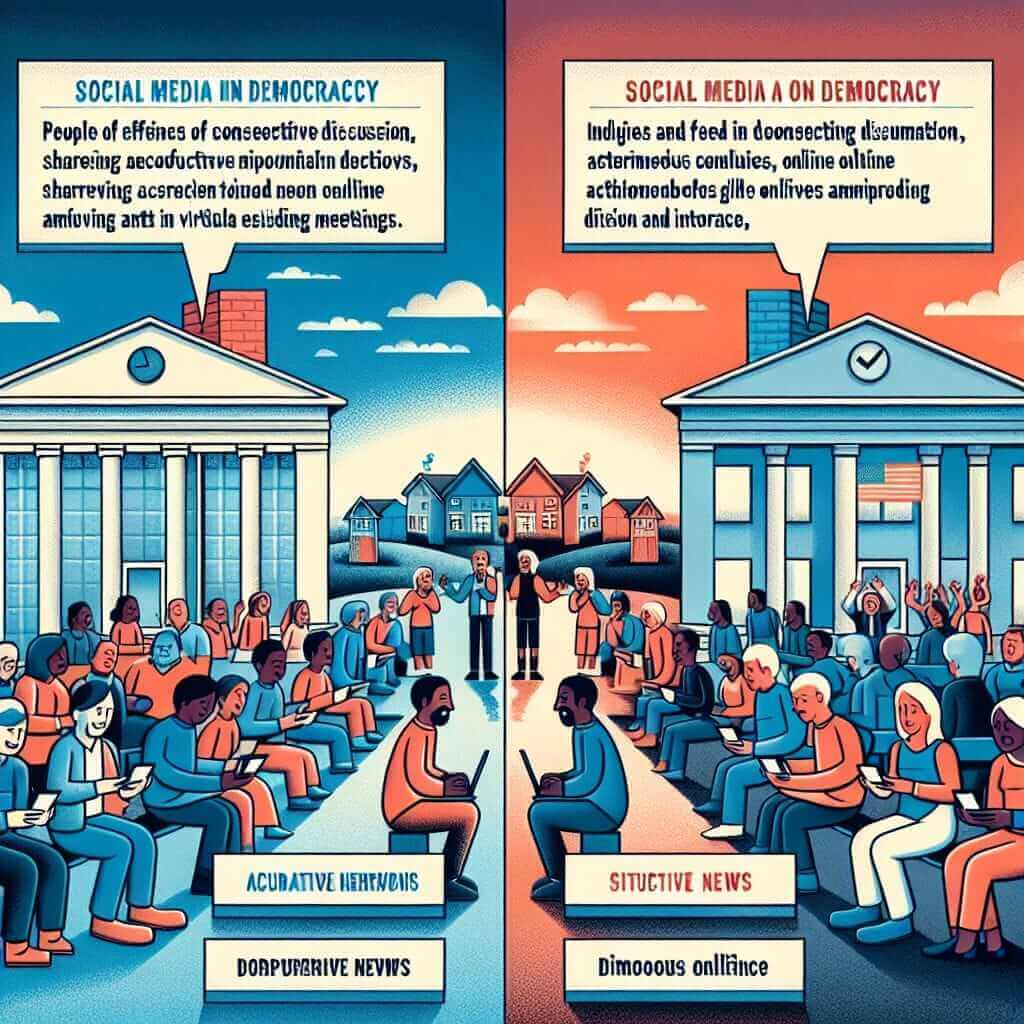The interaction between social media and democratic processes has become a prominent topic in the digital age. As we witness the rapid dissemination of information and ideas through various platforms, it raises questions about the impact on democracy. This topic has frequently surfaced in IELTS Writing Task 2, reflecting its relevance and importance in contemporary discussions.
Possible Essay Prompts:
- To what extent do you think social media has a positive or negative effect on democratic processes?
- Discuss the ways in which social media can influence election outcomes. Do you think this influence tends to be more beneficial or harmful?
- How has social media changed the relationship between politicians and the public? Do you believe this change is for the better or worse?
Main Content
1. Selecting an Essay Prompt
For this example, the chosen prompt is:
To what extent do you think social media has a positive or negative effect on democratic processes?
2. Analysis of the Prompt
To effectively explore this prompt, it is essential to examine both the positive and negative impacts of social media on democratic processes. You must present balanced arguments, ultimately concluding whether the effects are more beneficial or harmful overall.
3. Model Essay
Social media has undoubtedly revolutionized communication in modern society. Its influence permeates various aspects of life, including democratic processes. While social media provides a platform for increased political engagement and transparent communication, it also presents significant challenges such as misinformation and polarization. This essay will discuss the positive and negative effects of social media on democracy.
On the positive side, social media platforms enable citizens to engage more actively in the political process. Information about political events, policies, and debates is more accessible than ever. This accessibility encourages deeper public engagement and fosters a more informed electorate. For instance, movements such as the Arab Spring utilized social media to organize protests and disseminate information, highlighting the power of these tools in mobilizing the public and advocating for democratic reforms.
Moreover, social media facilitates direct communication between politicians and voters. This transparency helps build trust and accountability, as politicians can address public concerns swiftly and directly. Additionally, it allows for the pooling of public opinions, providing a more nuanced understanding of voter preferences and issues, leading to more responsive governance.

However, the influence of social media is not entirely positive. The spread of misinformation is a significant concern. Social media algorithms often prioritize sensational content, which can lead to the widespread dissemination of false or misleading information. This phenomenon can distort public perception and threaten the integrity of democratic processes. For example, false information about candidates or election procedures can influence voter behavior and potentially alter election outcomes.
Furthermore, social media can exacerbate societal polarization. Platforms often create echo chambers, where individuals are exposed predominantly to information and opinions that reinforce their existing beliefs. This can lead to a fragmented society, where dialogue between differing viewpoints diminishes, making consensus and compromise more difficult to achieve.
In conclusion, while social media offers substantial benefits for democratic engagement, it also poses significant challenges. The overall impact of social media on democratic processes depends on how society manages these tools. Implementing stronger regulations to combat misinformation and promote digital literacy can help mitigate the negative consequences. Therefore, it can be argued that social media has the potential to both positively and negatively affect democratic processes, with the balance perhaps leaning more towards the beneficial side if proper measures are taken.
Word count: 360 words
4. Key Considerations When Writing
- Balanced Analysis: Present both positive and negative effects to provide a well-rounded argument.
- Clear Examples: Use real-world examples to substantiate claims and illustrate impacts effectively.
- Cohesive Structure: Ensure logical flow and coherence in the essay with clear topic sentences and transitions.
5. Advanced Vocabulary and Phrases to Remember
- Dissemination (noun) /dɪˌsɛmɪˈneɪʃən/: The act of spreading something, especially information, widely.
- Electorate (noun) /ɪˈlɛktərɪt/: All the people in a country or area who are entitled to vote in an election.
- Polarization (noun) /ˌpoʊlərɪˈzeɪʃən/: Division into two sharply contrasting groups or sets of opinions or beliefs.
- Echo Chamber (noun) /ˌɛkoʊ ˈtʃeɪmbər/: An environment in which a person encounters only beliefs or opinions that coincide with their own, thereby reinforcing those beliefs.
- Nuanced (adj) /ˈnuːˌɑːnst/: Characterized by subtle and often complex distinctions in meaning.
Conclusion
The discussion on the effects of social media on democratic processes reveals a multifaceted issue with both positive and negative aspects. Preparing for IELTS Writing Task 2 with such complex topics requires thorough understanding and critical thinking. Practice these essay prompts and explore various angles to enhance your writing skills. Other related topics you might encounter include the impact of technology on politics, the role of media in shaping public opinion, and the challenges of maintaining democracy in the digital age.